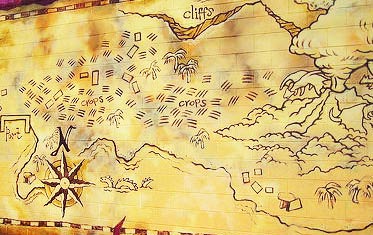 “The economy of the future will be based on relationship rather than possession.”
“The economy of the future will be based on relationship rather than possession.”
I remember reading that prediction by Wired Magazine futurist John Perry Barlow in 2003. The internet was careening from infancy to a wild toddlerhood, Napster was pummeling the music industry, and in-your-face pirate file-sharing sites with names like Demonoid, Pirate Bay, and Poisoned were springing up like toadstools after a July rain.
Wouldn’t the economy of the future be based on everyone protecting all their digital goodies? And holding on tight to their ideas and data? “The future will be based on relationship….” Uh, sure. Maybe relationships among happy intellectual property lawyers.
But Barlow was, of course, correct. And I thought that was pretty obvious to most of us at this point. From Facebook to Wikipedia to OpenStreetMaps, we’ve all seen the power of shared data, shared instruction, shared news, shared maps. Haven’t we?
Recently, in researching NRPA’s new industry-wide, user-driven database, PRORAGIS, I heard there were critics of the project. I was surprised, so I asked why. The criticism from some members, I learned, went something like this: “Our agency data belongs to us. If we share it to a central association platform, then others besides ourselves might profit from it.”
Hmmm….
I could spot a few flaws in this logic right from the get-go.
- Parks are not Microsoft. Last I checked, this is all public information. Public agencies. Public land. Public programs. Publicly approved budgets. Anyone can find an agency’s info and populate a database with it. But the thing is, you’ll probably benefit a whole lot more if you make sure it gets entered correctly. On a database set up to guarantee standards and designed for agency use.
- One party’s gain does not necessarily mean another party’s loss. Maybe with a budget or an acre of land—but not with data. If you data benefits your peers, or if it boosts your industry as a whole, does that mean there’s less of it available to benefit you? Nope. In fact, the more folks who go treasure-hunting in the database, the more valuable your little corner of it becomes.
- Park data will always be most valuable to park professionals--no matter who else might come along with ideas for how to turn a dime from PRORAGIS. Who else will ever have as much reason to compare agencies, show program impact, plan future facilities, or publicize the stunning array of services parks and recreation professionals provide?
Read the cover story on PRORAGIS to see how park leaders across the country are spinning the “straw” of basic park data into gold.
Maureen Hannan is the Senior Editor for Parks & Recreation magazine.

